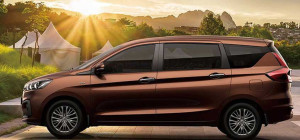 Driving at night can be risky. The driving conditions of the night are challenging and a large number of accidents take place during the night. Reduced visibility, perception of depth, peripheral vision, reduced colour recognition, etc. make it all the more difficult. We also become less alert at night. So, the risk of having an accident increases.
Driving at night can be risky. The driving conditions of the night are challenging and a large number of accidents take place during the night. Reduced visibility, perception of depth, peripheral vision, reduced colour recognition, etc. make it all the more difficult. We also become less alert at night. So, the risk of having an accident increases.
To avoid this, extra precautions should be followed during the night-time. A few simple measures can make your driving at night smoother, safer, and more enjoyable.
Let’s look at these in detail.
Use Your Lights Effectively
Since darkness impairs visibility, it is always wise to use your headlights, taillights, brake lights, and the indicator lights of your car to ensure that you can see the road and that drivers of other vehicles can see you.
You will need to make sure that both headlights work reliably and are of equal brightness, and that the beam alignments are correct. Ensure that your brake lights work too. You should also ensure the lights displaying yourpersonalised number plateare working.
Always clean your headlights before setting out on your drive. Make sure that the front and back lenses of the lights are clean to ensure their effectiveness in all conditions.
Dim the Interior Lights
Bright interior lighting can adversely affect your vision at night. Stray reflections from interior lights can be quite distracting too. Dim the lights of the dashboard and keep the map lights off if you don’t need them. Additional lights may cause glare within the car that will impair your vision and thus make it difficult to see the road.
Interior reading lights that are highly focused come in handy at night since they pinpoint objects without producing any glare inside the cabin of the vehicle.
Clean the Mirrors and Windshield
Apart from the headlights, taillights, and turn signals, it is important to clean your car’s mirrors, windows, and windshields properly. This is because snow or dirt accumulated on the windshield and windows can reduce visibility considerably.
Once you have cleaned them, avoid touching them with your hands as it will make the mirrors hazy and cause glare. Keep a clean cloth in the glove box of your car so that you can clean the mirrors and windows whenever they get hazy.
Drive More Slowly
Since visibility is reduced at night, the time taken to react to hazards on the road is longer than during the day.
On occasions, you may not be able to see pedestrians or animals on the road due to the road conditions and the lack of visibility. By the time they come in to view, it may be too late to avoid a collision. It is therefore recommended that you drive more slowly during the night.
If the visibility is very poor, you may need to go slower than the speed limit in order to stay safe. Ensure that your speed is slow enough for you to be able to stop within the distance illuminated by your car’s headlights.
Be Alert
It goes without saying that you should always be alert when driving. The problem with driving at night is that you might get weary and tired more quickly. Fatigue impairing your driving ability can be a major cause of accidents.
If you are sleepy, it is always advisable to pull over, find a rest stop, and get some sleep. This can avert major accidents. Try not to drive on an empty stomach. You can also get some caffeine to stay focused. When you are planning to drive at night always ensure that you are well-rested.
If you are traveling with someone, you can talk to him/her to avoid feeling fatigued or tired. You can also play music to stay awake whilst ensuring your car cabin is well ventilated and not stuffy or hot.
Carry an Emergency Kit
Even though cars manufactured today are extremely reliable and have a reduced probability of breaking down, it is always advisable to carry an emergency toolkit with you on your night drives to avoid getting stranded in the dark, particularly if your drive takes you to remote locations.
You should carry the essentials like a basic tool kit, a car jack, jumper leads, a flashlight, some water, and a first aid kit to ensure that any minor problem with your car can be resolved quickly and so you are able to ensure your own safety.
While driving at night, ensure you are alert. Follow all traffic rules and avoid any distractions that may affect your alertness. Avoid overtaking unless necessary due to slow vehicles posing a risk, and be extremely careful when making lane changes on the road. It is wise to always plan your trip in advance so that you do not become confused about the route to take in order to reach your destination.
A post byhttps://www.premier-plates.co.uk/







